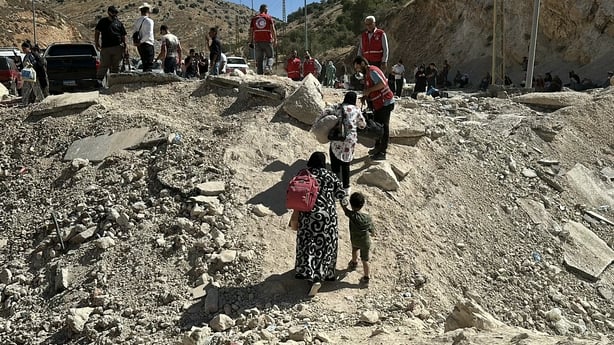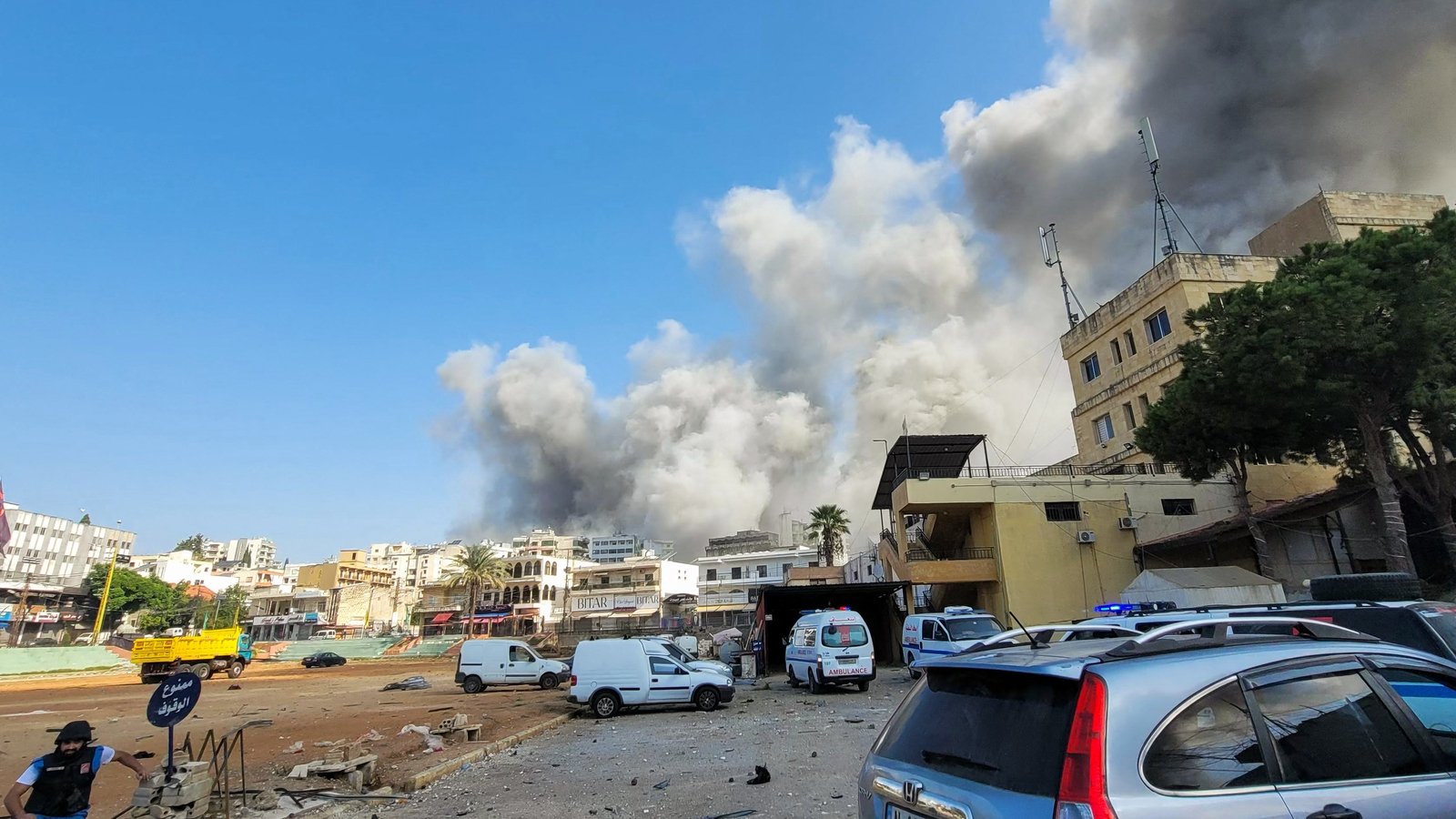A Lebanese official said Israel carried out 11 air strikes on the southern town Nabatiyeh and surrounding areas, days after strikes destroyed the southern city’s marketplace.
Nabatiyeh governor Howaida Turk said the intense raids “formed a kind of belt of fire” in the area. She reported casualties, but could not provide a precise toll.
A local official said the mayor of Nabatiyeh was killed in the strikes.
The Israeli military also launched strikes in southern Beirut, after Prime Minister Benjamin Netanyahu dismissed calls for a ceasefire in Lebanon, saying it would leave Hezbollah forces near his country’s border.
Reuters witnesses heard two blasts and saw plumes of smoke emerging from two separate neighbourhoods in Beirut’s southern suburbs. It came after Israel issued an evacuation order which mentioned only one building.
The Israeli military has in recent weeks carried out strikes on Beirut’s southern suburbs without advance warnings, or issued a warning for one area while striking more broadly.
It said it conducted a strike on what it said was an underground Hezbollah weapons stockpile in the southern Beirut suburb of Dahieh.
We need your consent to load this comcast-player contentWe use comcast-player to manage extra content that can set cookies on your device and collect data about your activity. Please review their details and accept them to load the content.Manage Preferences
“Prior to the strike, numerous steps were taken to mitigate the risk of harming civilians, including advancing warnings to the population in the area,” the Israeli military said.
Israeli military evacuation orders were also affecting more than a quarter of Lebanon, according to the UN refugee agency, two weeks after Israel began incursions into the south of the country that it says are aimed at pushing back Hezbollah.
Some Western countries have been pushing for a ceasefire between the two neighbours, as well as in Gaza, though the United States says it continues to support Israel and was sending an anti-missile system and troops.
Yesterday, State Department spokesperson Matthew Miller said the US had expressed its concerns to Prime Minister Benjamin Netanyahu’s administration on the recent strikes.
“When it comes to the scope and nature of the bombing campaign that we saw in Beirut over the past few weeks, it’s something that we made clear to the government of Israel we had concerns with and we were opposed to,” he told reporters, adopting a harsher tone than Washington has taken so far.
Lebanon’s caretaker Prime Minister Najib Mikati had said his contacts with US officials had produced a “kind of guarantee” that Israel would tamp down strikes on Beirut and its southern suburbs.
The last time Beirut was hit was on 10 October, when two strikes near the city centre killed 22 people and brought down entire buildings in a densely populated neighbourhood.
Lebanese security sources said at the time that Hezbollah official Wafiq Safa was the target but that he had survived. There was no comment from Israel.

Israel has been turning up the heat on Iran-backed Hezbollah since it began incursions into Lebanon after killing Hezbollah leaders and commanders, including its veteran secretary-general Hassan Nasrallah last month in the biggest blow to the group in decades.
Mr Netanyahu told French President Emmanuel Macron during a phone conversation yesterday that he opposed a unilateral ceasefire and said he was “taken aback” by Mr Macron’s plan to hold a conference on Lebanon, according to an Israeli readout.
“A reminder to the French President: It was not a UN decision that established the State of Israel but the victory that was achieved in the War of Independence … ,” Mr Netanyahu’s office said in a separate statement.
The pair have previously clashed, including over Mr Macron’s call to halt arm sales to Israel.
With diplomatic efforts stalled, the fighting continues.
The Israeli military said it had captured three members of Hezbollah’s elite Radwan forces and they had been moved to Israel for investigation. Hezbollah has not commented.
Its deputy chief Naim Qassem said yesterday that the Iran-backed group would inflict “pain” on Israel but he also called for a ceasefire.
“After the ceasefire, according to an indirect agreement, the settlers would return to the north and other steps will be drawn up,” Mr Qassem said in a recorded speech.
There was no immediate comment from Israel, which says its operation in Lebanon aims to secure the return of tens of thousands of residents forced to flee their homes in northern Israel because of Hezbollah attacks.
The Israeli military said around 50 projectiles were fired from Lebanon at the country’s north early this morning, without any reports of casualties.
“Some of the projectiles were intercepted and fallen projectiles were identified in the area,” a military statement said, while Hezbollah said it launched “a large salvo of missiles” at the town of Safed.
Israeli strikes have killed at least 2,350 people over the last year in Lebanon and left nearly 11,000 wounded, according to the Lebanese health ministry, and more than 1.2 million people have been displaced.
The toll does not distinguish between civilians and combatants but includes hundreds of women and children.
The figures underscore the heavy price Lebanese are paying as Israel tries to destroy the Iran-backed militant group’s infrastructure in their conflict, which resumed a year ago when it began firing rockets at Israel in support of Hamas at the start of the Gaza war.

